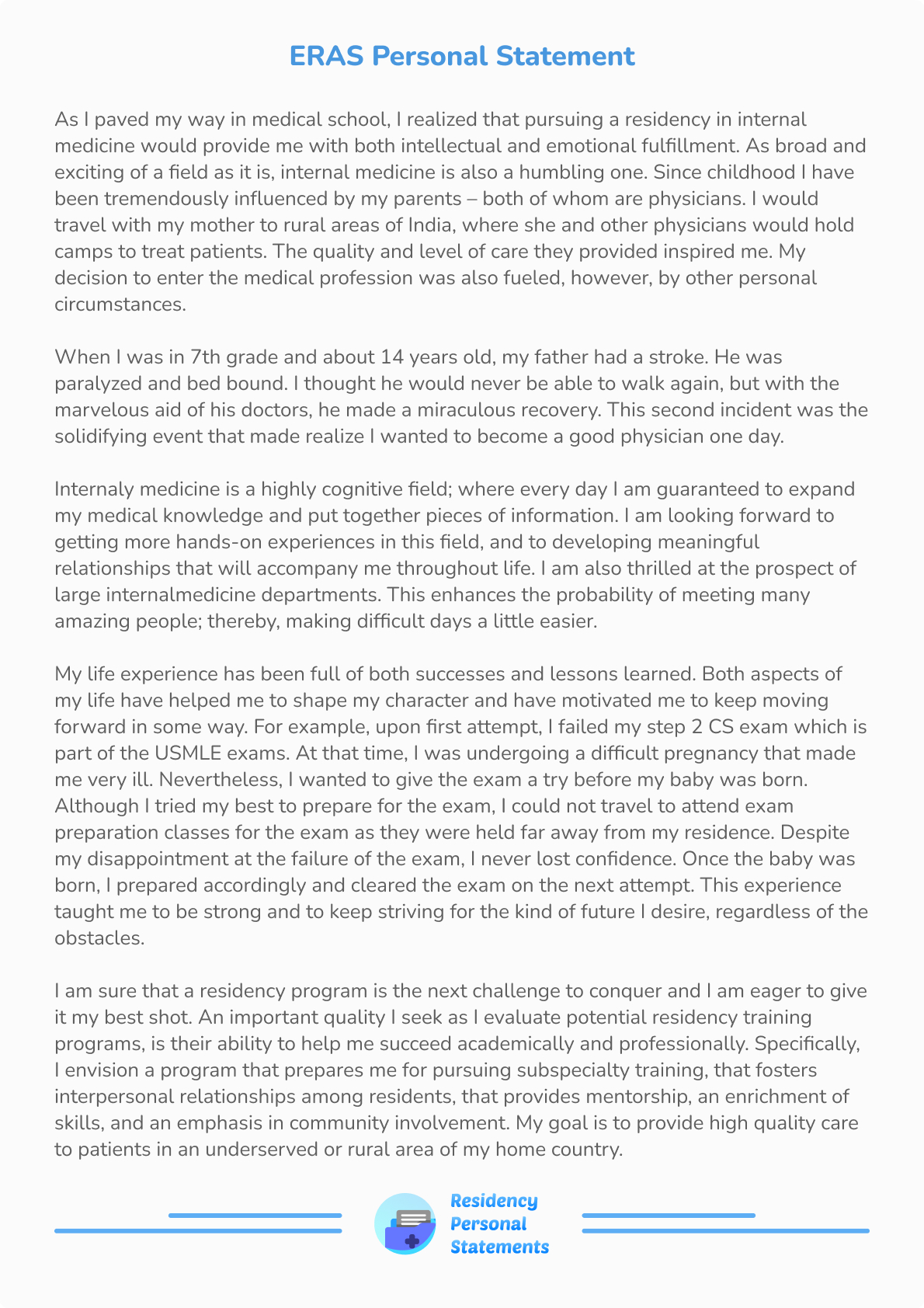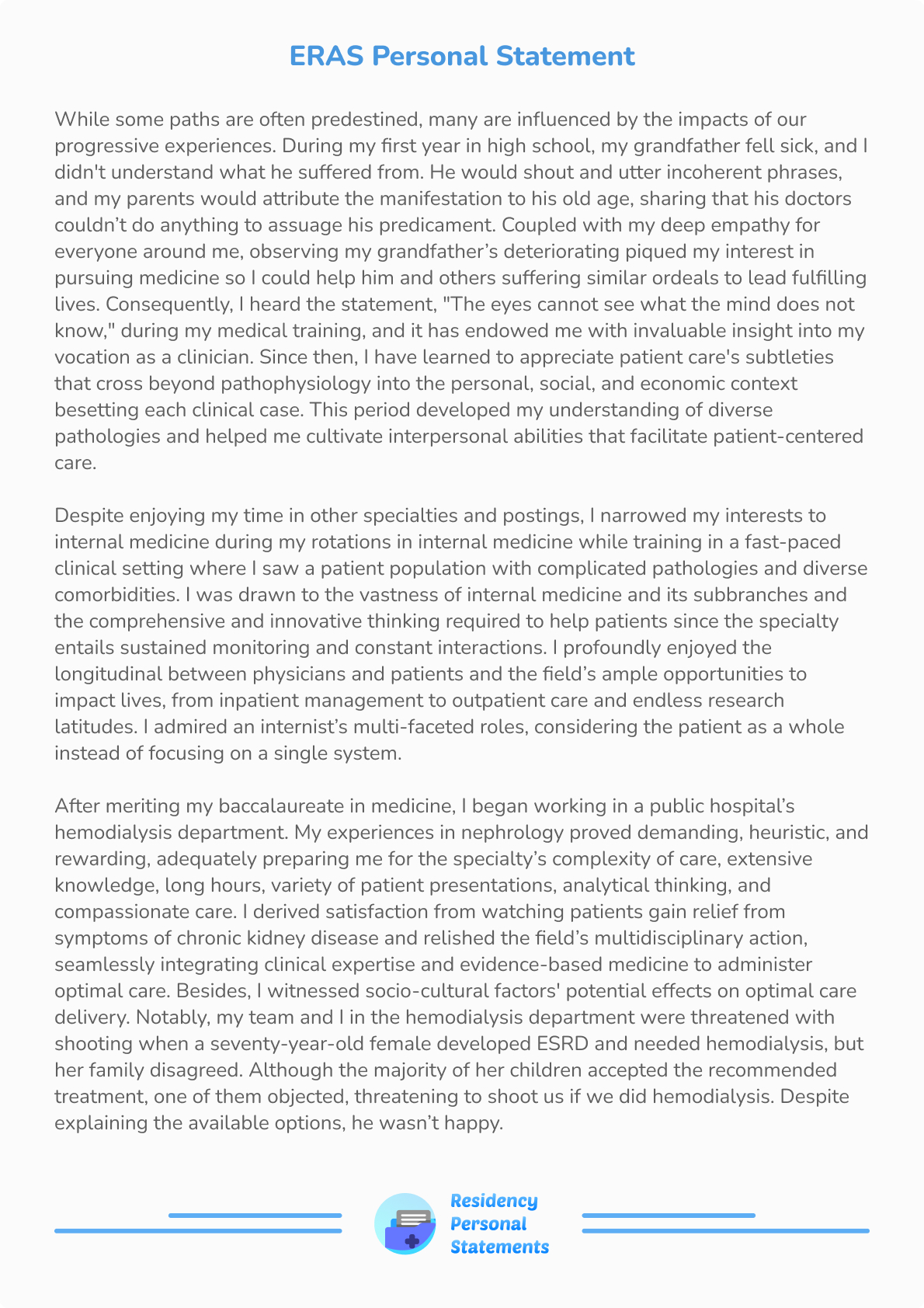
Some Reflections on the Importance of Personal Statement ERAS
There are several fundamental opinions on compiling various applications. Some believe that a good personal statement ERAS is one of the most critical parts of your application package and this makes the difference between getting the desired confirmation or rejection. Another opinion is that although it is an integral part of admission, this is not what is too much to rely on, as the committees do not review these papers as closely as people think.
The truth is always in the middle, and the most important thing to get from these two opinions is that your document should be good. Why? Because in any case, your application will be viewed, and if it is, so to say, standard and will meet all requirements of the format, it will not cause any questions and perhaps be able to draw attention to your candidacy and add you a couple of points. Crafting a well-structured ERAS personal statement that meets formatting guidelines can enhance your chances of standing out positively to the admissions committee. But if you think writing an ERAS personal statement is just a formality and you can ignore some requirements, this will certainly pay attention. And here you can be sure it will become a problem.
Therefore, it is better to put aside thinking and philosophizing about the importance of personal application and do everything as it should and correctly.
Where to Start Your ERAS Personal Statement
Let’s start with the basics and briefly explain or remind you what ERAS is, who uses it, and how to prepare your personal statement for ERAS on this platform to benefit from it.
ERAS is an electronic residency application service, through which you submit all the necessary documents for ERAS® residency applicants and can receive feedback on the status of your application. It streamlines the application process by allowing applicants to simultaneously submit their materials, including applications, to multiple programs. But where do you start when it comes to preparing your personal statement ERAS?
- Oddly enough, the hardest part is getting started. Put away the fear of a blank slate and transfer your thoughts to a draft. Think about the qualities making you a unique and attractive candidate. Identify key moments or encounters which ignited your passion.
- Then do thorough research on the programs of your interest. Become familiar with the missions, values, and desired qualities of applicants. This knowledge will help you tailor your application to meet their expectations and demonstrate your appropriatness for their program.
- Also, seek feedback and advice from mentors, professors, or health professionals who can offer valuable advice and guidance. Engage in self-reflection and brainstorming to organize your thoughts and ideas.
By beginning your preparation with self-reflection, research, and seeking recommendations, you will be well on your way to writing a compelling personal statement and demonstrating your unique qualities to residency programs.
Regarding the logical question about ERAS personal statement how to submit it we can note the following. Applications are submitted through the MyERAS Personal Application, a secure online platform that simplifies the residency application process and gives candidates a clear understanding of deadlines and requirements.
Optimal ERAS Personal Statement Length
This is quite a contra version that causes a lot of debate among future residents. Namely, a lot or a little volume is allocated to writing the application.
The standard ERAS personal statement length is usually about one page. This is sufficient to convey your motivations, experiences, and goals objectively and clearly while ensuring that your text is concise and focused. It is important to adhere to these length guidelines, as exceeding the recommended ERAS personal statement word count can lead to your work being ignored or marked as unsuccessful.
On the other hand, a personal statement ERAS length which is too short, can give the impression that you have nothing to say about yourself and lack the necessary qualities. Strike a balance between sufficient detail and brevity to maximize the impact of your statement on ERAS.
How Long Should ERAS Personal Statement Be?
As we said earlier, your personal statement should fit on one page. When it comes to the ERAS personal statement character limit, it has remained the same. Your application should be no less than 750 and no more than 900 characters. It is important to follow these length guidelines as closely as possible. Note, the documents with excessive word count will be shortened automatically or may be canceled.
General ERAS Personal Statement Requirements
While most of the ERAS requirements relate to the formatting and length of submissions, it is also important to consider the specifics of your submissions. Pay careful attention to ERAS personal statement formatting, as proper structure and layout can enhance readability and make a strong first impression. The system is not as strict on the context of a personal statement , but the quality of it is essential, first of all, to attract the attention of admissions committees and your success.
Your personal statement ERAS should present a compelling narrative that demonstrates your passion, highlights your relevant experience, and highlights your unique qualities as a candidate. Be clear and concise in your self-presentation, ensuring your ideas flow logically and coherently. Also, emphasize your personal growth and the lessons you’ve learned along your medical journey. Use specific examples to highlight your strengths and show how those experiences influenced your decision to apply for residency.
Common Mistakes to Avoid
The text of the ERAS personal statement is not too long and does not take more than a page, but even in this small field, you can make many mistakes that prevent you from getting the desired result.
- Lack of focus: Don’t try to cover too many topics and instead focus on a few key impressions or qualities.
- Poor structure: A disorganized and ignoring ERAS personal statement formatting structure can make your application’s narrative difficult to follow. Provide a logical flow, using paragraphs and transitions to make your message coherent.
- Generic content: General statements lacking personalization and examples of personal experience may not be memorable. Instead, emphasize the unique skills and knowledge set you apart from other candidates.
- Grammatical errors and typos: Neglecting to proofread your personal statement can undermine your professionalism and leave poor impression.
Requirements Regarding ERAS Personal Statement Formatting
The platform imposes strict requirements not only on the ERAS personal statement word limit but also has strict formatting requirements.
- Font and size: Use a clear and legible font, such as Times New Roman or Arial. The recommended font size is usually 10-12 points to ensure readability.
- Alignment and spacing: Left-align the text and use single spacing. Avoid using extra spacing between paragraphs or lines, as this can make your narrative look disjointed or elongated.
- Paragraph structure: For better readability, divide your ERAS personal statement into paragraphs. Each paragraph should focus on a specific topic or idea; a blank line is recommended for visual separation between paragraphs.
- Special characters and formatting styles: Avoid using special characters, symbols, or formatting styles (bold, italic, underline) in your statement. Stick to plain text (ASCII) formatting to ensure compatibility with various systems.
Remember also, that you need not only to know how long should ERAS personal statement be but also to ensure it’s free from any inconsistencies, grammatical errors, or typos. A polished ERAS personal statement format can make your submission more professional and easier for reviewers to navigate. So proofread your application several times before and after formatting.
Red Flags Residency Personal Statement to Consider
Indeed you have already read a lot of expert advice and recommendations regarding creating a personal statement ERAS. And you know that there should be no lies, exaggerations, and deceit here. The same applies to red flags, which intimidate most applicants:
- Lack of reflection and growth, e.g., if more than 5 years have passed from graduation to application, this is already a red flag.
- Any academic gaps for several years related to your chosen major.
- Negative attitudes, including bad experiences, past job failures, or toxicity to former colleagues.
- Lack of connection to the program, e.g., lack of appropriate educational background or failure to demonstrate a genuine understanding of a particular program’s possibilities.
- Lack of professionalism – such as clinical experience in the United States, essential to have while applying to U.S. residencies.
These ones are the most common red flags residency personal statement that most applicants want to hide. However, you should not do it. Instead, you must try to explain your position, turning your red flags into your zest.
Get Professional Help From Admission Experts
The requirements and features of eras applications are only easy for those who have processed hundreds of them, so it’s normal for you to need expert feedback or support. No matter what reason you need assistance with, whether it’s a desire to sort out red flags or the pursuit of perfectionism regarding ERAS personal statement requirements, our writing professionals are here to lend a helping hand 24/7.
With vast experience and a thorough understanding of all the nuances of the admission process, our writers are ready to work on your application, turning an ordinary document into an outstanding personal statement ERAS that will lead you to victory.
Leave all doubts behind and rely on us. Just a couple of lines asking for help, and all your writing issues will be solved!

SOME ADVICE ON HOW TO MAKE A HAND SURGERY FELLOWSHIP PERSONAL STATEMENT OUTSTANDING
Interested in applying for hand surgery fellowship or hepatology fellowship? Surgeons who want to specialize in hand surgery can get more training in this field when they apply for a fellowship. Among the usual requirements that are asked by schools are updated curriculum vitae, medical school transcripts and or diploma, letters of recommendation (at least three), […]
Read More
ERAS Personal Statement Word Count
As the most significant part of your application, an ERAS personal statement can be your greatest chance to succeed. Basically, this type of document will help you to state the reason why you’ve chosen that particular field and convince the committee that you’re the best candidate for the position. .Be mindful of the personal statement […]
Read More

